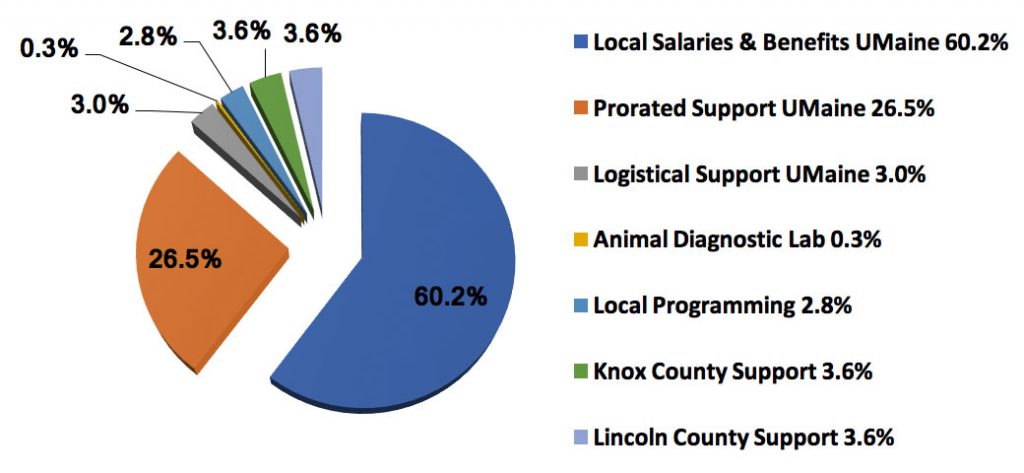2017 Annual Report
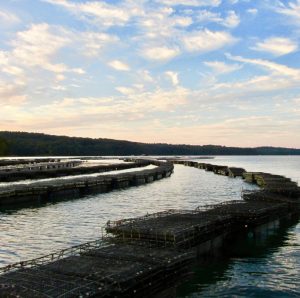
University of Maine Cooperative Extension Knox & Lincoln Counties
2017 Annual Report
Putting university research to work in homes, businesses, farms and communities for over 100 years.
The University of Maine is an equal opportunity/affirmative action institution.
Download a print-friendly copy of the 2017 Annual Report (PDF).
Knox-Lincoln County Extension Association
Executive Committee 2017
- Joseph Lobley, President
- Aaron Englander, Vice President
- Nick Smith, Secretary
- Jack Green, Treasurer
- Linda Bonin
University of Maine Cooperative Extension seeks volunteers to serve on the Knox-Lincoln Counties Executive Committee
UMaine Extension can only be successful with the help of county residents serving on the Executive Committee. Board members provide oversight and support to staff, as well as, help promote programs.
Knox-Lincoln Extension is one of the most active in the state providing a broad range of programs: 4-H youth development, farm-to-school programs educating kids on healthy food choices, assistance to commercial farmers and home gardeners, support for fishermen facing impacts due to warming temperatures in the Gulf of Maine, ongoing monitoring of coastal water quality, and in-home education for new parents.
Executive Committee members are asked to attend four two-hour meetings a year focusing on county programming, building maintenance and finances. Members can certainly follow their interests and become more involved in any of the county programs.
If you’re interested in UMaine Extension Programs and giving back to your community, serving on the Executive Committee is a great place to be!
For more information, please contact Esperanza Stancioff 207.832.0343, in Maine 800.244.2104 or email esp@maine.edu.
UMaine Extension Knox-Lincoln Counties Staff
377 Manktown Road
Waldoboro, ME 04572-5815
207.832.0343 or 800.244.2104 (in Maine)
Fax: 207.832.0377
extension.knoxlincoln@maine.edu
Extension Educators
- Mark Hutchinson
- Esperanza Stancioff
Professionals
- Jennifer Doherty
- Heather Elowe
- Ruth Griffin
- Kathryn Jensen
- Keri Kaczor
- Heather Knowles
- Rebecca Koller
- Sara Randall
- Brooke Sanborn
- Meagan Sims
- Claudia Williamson
- Corinne Wilson
Community Education Assistants
- Cindy Rogers
- Liz Stanley
Administrative Specialists
- Pamela Doherty
- Cindi Staples
President’s Message
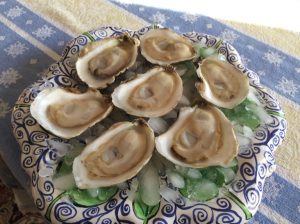
University of Maine Cooperative Extension continues to serve our communities with widely diverse programs, each addressing a specific purpose. Our Knox-Lincoln Counties staff provides local public education in family care of infants, keeping our beaches healthy, adapting to climate change, home horticulture, commercial agriculture, and 4-H youth development. Through this cooperative endeavor, the University of Maine provides salaries for researchers, educators, and professionals, while our local taxes pay for our building as well as salaries for support staff. In addition, our programs are aided and enhanced by hundreds of volunteers from the community. We are grateful to every single person who helps to make our programs successful, and we truly appreciate the essential financial support provided by Knox and Lincoln Counties. The Knox-Lincoln Cooperative Extension Association (KLCEA) Executive Committee oversees the budget for our facility and helps support our programs. We are currently looking for additional community members to serve on our Executive Committee. This is truly a multifaceted cooperative effort in community service.
The 2017 KLCEA annual meeting took us to Mook Sea Farm in Walpole, where oysters are reared from seed to adults, tended by a highly educated staff who, in turn, educated us. The facility is run as a state-of-the-art, controlled environment laboratory where oyster seed are kept disease-free until the disease-resistant young oysters can be moved to cages in the Damariscotta River where they will grow into adults. Quite the experience!
Our 2018 annual meeting will take place in Rockport at Erickson Fields Preserve, which, along with Aldermere Farm, is part of Maine Coast Heritage Trust. Executive Committee member Aaron Englander, program manager of the preserve, will teach us about the incredible agricultural education projects he oversees. The date is September 12, 5-7 pm and the public is welcome. Please join us.
— Joe Lobley, KLCEA Executive Committee President
UMaine Extension Knox-Lincoln Counties Financial Resources
This graph illustrates the financial resources for programs offered, supported and managed from the Knox & Lincoln Counties office. Each year, Knox & Lincoln Counties tax dollars support UMaine Extension with physical office space, support staff salaries, office supplies, equipment and programming expenses.
As a unique partnership among federal, state and county governments, UMaine Extension uses funding from Maine counties and the University to match and leverage support from the United States Department of Agriculture, other federal grantors, state agencies and private foundations. Each UMaine Extension county office is also part of a statewide organization and the national Extension system.
4-H Youth Development
Information: kathryn.a.jensen@maine.edu
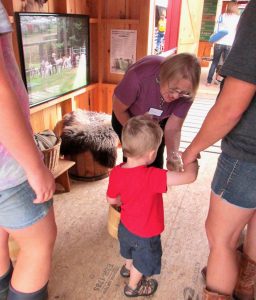 The Knox-Lincoln 4-H Program had 96 members, 6 clubs and 27 volunteers enrolled in 2017.
The Knox-Lincoln 4-H Program had 96 members, 6 clubs and 27 volunteers enrolled in 2017.
2017 marked the sixth year that Knox-Lincoln 4-H has presented 4-H Farm-to-Fair at the Union Fair. This educational exhibit offers the youngest members of the public a glimpse into life on a working farm using interactive displays. To ensure a consistent daily “staff” to assist the principle adult volunteer, the Knox-Lincoln 4-H Leaders’ Association selected two teen 4-H members as Youth Helpers. In exchange, scholarship funds were given to later attend a nationally-sponsored 4-H leadership trip. Savannah Dube and Nathan Dube of the Jolly Farmers 4-H Club in Cooper’s Mills took on this task admirably! Both plan to use their scholarships to attend 4-H Citizenship Washington Focus in our nation’s capital in July, 2018. Scholarship funds were raised through the semi-annual 4-H Paper Clover Campaign at local Tractor Supply Company Stores.
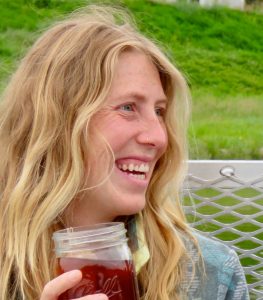 4-H Youth Development Professional, Kathryn Jensen, joined our team in September. Kathryn comes to us with a background in agricultural and environmental education. Working mostly in non-formal educational settings with ages pre-k through high school, her passion for and background in experiential education transfers into working with our youth in 4-H. Kathryn has most recently worked for the Chewonki Foundation, Morris Farm, and Kidz Go Eco. In her new role, she has started and maintained several after school offerings in our counties, including an ongoing 4-H club at Prescott Memorial School in Washington focused on gardening and ecology, and ecology-based programs at Vose Library in Union. Kathryn has been establishing relationships within the Knox-Lincoln Counties community, and compiling needs assessments to address gaps in experiential education opportunities in the area.
4-H Youth Development Professional, Kathryn Jensen, joined our team in September. Kathryn comes to us with a background in agricultural and environmental education. Working mostly in non-formal educational settings with ages pre-k through high school, her passion for and background in experiential education transfers into working with our youth in 4-H. Kathryn has most recently worked for the Chewonki Foundation, Morris Farm, and Kidz Go Eco. In her new role, she has started and maintained several after school offerings in our counties, including an ongoing 4-H club at Prescott Memorial School in Washington focused on gardening and ecology, and ecology-based programs at Vose Library in Union. Kathryn has been establishing relationships within the Knox-Lincoln Counties community, and compiling needs assessments to address gaps in experiential education opportunities in the area.
Parent Education
Information: jennifer.d.doherty@maine.edu
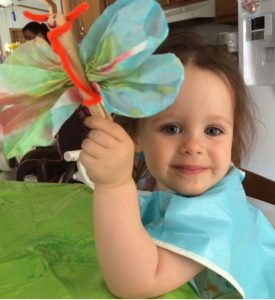 The Maine Families Program is a free home visiting program available to all families who are pregnant or have a newborn at home. As part of a statewide network of Maine Families Programs, and utilizing the evidenced based model, Parents As TeachersTM (PAT), our team of trained professionals partner with local families to support them in their role as their child’s first and most important teacher. This year, with federal funding from the Maternal Infant Early Childhood Home Visiting Program (MIECHV), as well as critical state and local funding, our program:
The Maine Families Program is a free home visiting program available to all families who are pregnant or have a newborn at home. As part of a statewide network of Maine Families Programs, and utilizing the evidenced based model, Parents As TeachersTM (PAT), our team of trained professionals partner with local families to support them in their role as their child’s first and most important teacher. This year, with federal funding from the Maternal Infant Early Childhood Home Visiting Program (MIECHV), as well as critical state and local funding, our program:
- Provided 1,562 home visits to 197 local families and 195 children.
- Facilitated 19 playgroups in the community.
- Earned a prestigious endorsement by Parents As TeachersTM national center as a Blue Ribbon Affiliate, making us one of the top performing early education home visiting affiliates within the international PATTM
- In March, we hired a new parent education professional, Rebecca Koller.
- Heather Knowles became the sixth member of our team to become a certified lactation counselor. This training allows our parent educators to provide nutrition and breastfeeding education and support to enrolled families.
Our Parent Program of Mid-Coast Maine Governing Board provided over 154 volunteer hours.
Climate Change
Information: esp@maine.edu
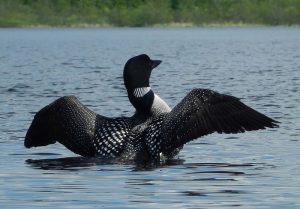
With Signs of the Seasons (SOS) now in our 8th year, state and national climate change and phenology scientists continue to use SOS observations to study changes in the timing of seasonal events. SOS expanded its partnerships with Maine Audubon, Coastal Maine Botanical Gardens, UMaine Machias, and Downeast Institute setting up long-term monitoring sites and continuing to work with local scientists and volunteers to provide needed data. An SOS article was highlighted for a special citizen science issue in Maine Policy Review 2017. SOS initiated online educational opportunities with three webinars focused on collaborating research: Through evaluations, volunteers reported they have increased their knowledge of species observed, and our changing climate; and as a result, have taken action to address climate change.
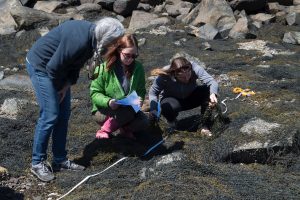
The Maine Climate Change Adaptation Providers (CCAP) Network, coordinated by UMaine Extension and Sea Grant includes 60 members representing local, state and federal government, academic and research institutes and non-profit organizations, whose intent is to help improve communication across practitioners, determine mutual goals and activities, as we each work to assist coastal communities on climate change adaptation and resilience. Meetings held bi-annually have resulted in many shared projects, funding awards, and students working on combined projects — all as a result of the CCAP Network.
Maine Healthy Beaches
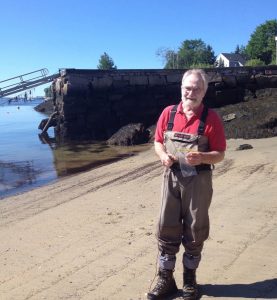
Information: meagan.sims@maine.edu
Maine Healthy Beaches (MHB) is coordinated by UMaine Extension and is the state’s only unified, non-regulatory program for assessing bacterial pollution risk and notifying the public of real-time of water quality conditions on coastal beaches. Annually, staff train nearly 200 citizen scientists to collect and report data for beaches spanning Kittery to MDI. The Knox-Lincoln office provides laboratory analysis for Lincolnville, Camden, Rockport, Rockland and S. Bristol.
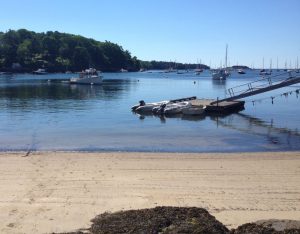
Extension staff also work with diverse partners to identify and clean up bacterial pollution sources that threaten public health and degrade coastal ecosystems; for example, malfunctioning septic systems, broken sewer lines, boat waste and illicit cross connections between sewer and storm water infrastructure.
Humans are not the only source of fecal contamination contributing to impaired water quality. Waste from pets and other warm-blooded animals are part of the problem too. Typically, multiple sources act together to increase bacteria levels at the shoreline, especially when it rains.
Please do your part to help keep our beaches safe and healthy!
Home Horticulture
Information: elizabeth.stanley@maine.edu
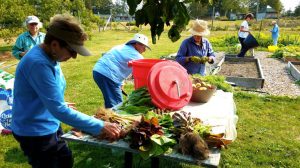
The Master Gardener Volunteer program in Knox, Lincoln & Waldo Counties provides over 50 hours of training in the art and science of horticulture. In return, Master Gardeners volunteer at school, community, and public gardens, conduct educational programs, and support Maine Harvest for Hunger — UMaine Extension’s food security initiative. MGVs reported over 4,679 hours of volunteer work in 2017.
 Home and Community Client Calls
Home and Community Client Calls
We received over 428 calls, emails and in-person visits from home, school and professional gardeners. Topics included identification and control of invasive plant and insect species, management of plant diseases and pests, growing advice for vegetables and ornamentals, and help with problems related to drought. Callers are given information from UMaine Extension’s Garden & Yard website and when needed, help from specialists. Clients receive research-based information focusing on integrated pest management and reduced use of pesticides and fertilizers for more sustainable Maine landscapes.
Commercial Agriculture
Information: mhutch@maine.edu
Maine State Prison Horticultural Program
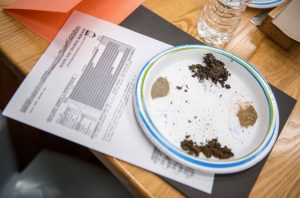
The Maine State Prison (MSP) has a population of approximately 1,000, serving about 3,000 meals per day. In 2015, Warden Liberty approved a program for inmates to grow fresh produce at the maximum-security facility instead of ornamentals. The University of Maine Cooperative Extension partnered with MSP to provide horticultural educational programming and technical assistance to inmates participating in the program. In 2017, approximately 9,000 pounds of food was produced for us in the facilities dining hall and an additional 700 pounds was donated to local food pantries. This amounted to an approximate $3,000/ month savings in food purchases during the growing season. In addition, food scraps from the food service area were collected and composted on site. The finish compost is used to amend the soil for production. This also reduced the trash tipping fees by approximately $45,000/year. The educational program also develops job skills that are needed by the agricultural industry for when they are released.
Large Animal Mortality Management Training
Two large animal mortality management trainings were held at the University of Maine Compost Research and Education Center located at Highmoor Farm a University of Maine Experimental Station in Monmouth. This is the only USDA approved training for subject matter experts in the United States. A total of 35 attendees participated in hands-on experiential learning while developing skills to respond to emergencies and or large animal disease outbreaks throughout the United States.

The County Extension Act
The County Extension Act explains the role of county government in funding local Extension offices.
Cooperative Extension work shall consist of the giving of practical demonstrations in agriculture and natural resources, youth development, and home economics and community life and imparting information on those subjects through field demonstrations, publications and otherwise. For the purpose of carrying out this chapter, there may be created in each county or combination of two counties within the State an organization known as a “county extension association,” and its services available to all residents of a county. The county extension is viewed as a unique and important educational program of county government. The executive committee of each county extension association shall prepare an annual budget as requested, showing in detail its estimate of the amount of money to be expended under this chapter within the county of counties for the fiscal year. The executive committee shall submit to the board of county commissioners on a date requested by the county commissioners, and the county commissioners may, if they deem it justifiable, adopt an appropriate budget for the county extension program and levy a tax therefore. The amount thus raised by direct taxation within any county or combination of counties for the purposes of this chapter shall be used for the salaries of clerks, provision of office space, supplies, equipment, postage, telephone, a contribution toward the salaries of county educators and such other expenses as necessary to maintain an effective county extension program.1
1Excerpted from Title 7, Chapter 7 of the Maine Revised Statutes, §191–§195.
UMaine Extension Resources for Gardeners
For more information contact
University of Maine Cooperative Extension
Knox-Lincoln Counties
377 Manktown Road
Waldoboro, ME 04864
207.832.0343 or 800.244.2104 (in Maine)
extension.knoxlincoln@maine.edu
University of Maine Cooperative Extension’s successful educational programs result from a federal, state and county government partnership. Since 1919, when the Maine Legislature passed the County Extension Act, the University of Maine has been in all Maine communities with a county office whose operations are funded by county government. Our educational programs anticipate and respond to local and state needs and issues. We also communicate those issues and opportunities to UMaine faculty to influence their research and development plans.
©2018
The University of Maine Cooperative Extension Knox-Lincoln Counties office is an EEO/AA employer, and does not discriminate on the grounds of race, color, religion, sex, sexual orientation, transgender status, gender expression, national origin, citizenship status, age, disability, genetic information or veteran’s status in employment, education, and all other programs and activities. The following person has been designated to handle inquiries regarding non-discrimination policies: Sarah E. Harebo, Director of Equal Opportunity, 101 North Stevens Hall, University of Maine, Orono, ME 04469-5754, 207.581.1226, TTY 711 (Maine Relay System).

